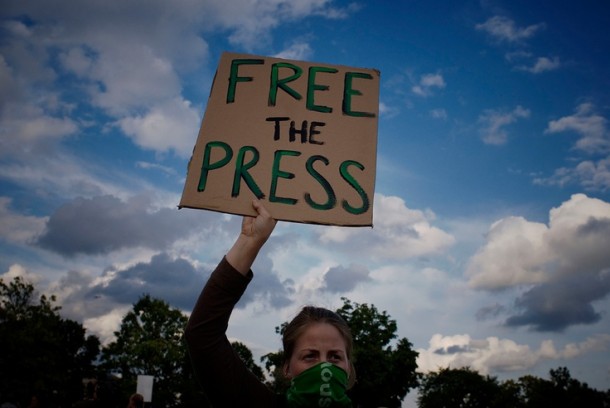While the humanitarian crisis in Syria is deepening, journalists are becoming the new target of violence. Being a correspondent during the wartimes has always been dangerous and unpredictable but lately the chaotic situation in Syria has given another dimension to the Freedom of Press and Expression, which previously was achieved by giving more rights to journalists, but lately it seems to be achieved with sacrificing those rights. Many professional journalists and freelancers are employed to provide the Media coverage and reveal the cruelty that is taking place in Syria, a cruelty that devours them.
The deteriorating situation has brought into attentions mysterious cases on disappeared, kidnapped and injured journalists, thus making Syria a threatening territory for Media correspondents who are just doing their job in the pursuit of glorification and reward. Reporters Without Borders (RSF) present their recent findings on the critical situation, indicating that the number of crimes towards journalists is increasing, thus new and coherent resolutions from the UN must be adopted to promote safety and security.
During 2015 three journalists were killed in Syria as a matter of exercising their activity in the Syrian territory. RSF is also concerned on the case of the three Spanish disappeared freelance journalists, respectively Antonio Pampliega, Angle Sastre and Jose Manuel Lopez, reported missing since 13 July 2015. Yet, these are not the only cases of disappeared journalists, as many others remain mysterious and kept away from public attention. Apparently, freelance journalists have been the easiest target, as they often work with limited job responsibilities and privileges, making it more difficult for their companies to investigate on real basis and prosecute the crimes.
Not only foreign journalists but also the local ones are attacked, as in the case of the founder of the Syrian Centre for Media and Freedom of Expression, Mazen Darwish, who was arrested by Syrian authorities and is being held by the government out of his professional duties for more than three years. This tyrannical environment is suppressing the Freedom of Media.
In the above mentioned cases of the foreign journalists, the discrete information with no evidence of how/where/when the journalists disappeared makes the situation more complex, limiting the Powers of Media and International Organizations to come up with concrete information and solutions to these events. However, this does not justify the Media for failing to perform its job properly when it comes to ensuring the protection of its correspondents.
The question ”How the Media Should React?” is another concern for delivering the situation in a timely manner. A prompt reaction of the Media would be successful if they carefully investigated the attacks on the victims and ensure the transparency of the findings. Governments and official authorities should follow such procedures and open a criminal case or use more effective law enforcement tools that would deliver swift results. Otherwise everyone would lose faith on Media Coverage and their democratic aim to express and present ”the real face of the World Developments”.
RFS is encouraging the UN to ensure that Syria is under the obligation to respect the Resolutions on the safety of journalists. They have also sent open letters to UN authorities and the Security Council mentioning the need for rapid responses. The Media’s reaction is highly dependent on such powerful international organization such as UN, OSCE and their working bodies, therefore it must bring into the centre of attention every case, awakening the International Community and asking for support and immediate action from other responsible authorities.
From a realistic point of view Media is easily suppressed by the Government and Political Authorities on taking action that can damage the image of a country, but the Disappearance of Journalists is becoming a major issue that cannot wait and allow bureaucracies to prevail. The Media should treat the safety of journalists as a priority and address the problems to the International Criminal Court in order to save not only the humans’ life but also its reputation as the most democratic tool of freedom expression.

